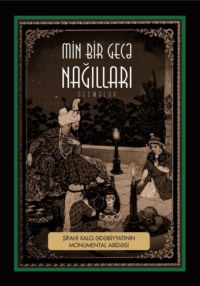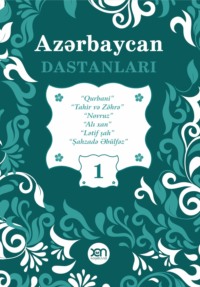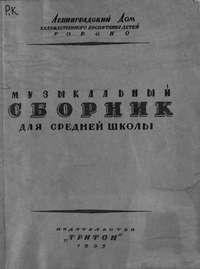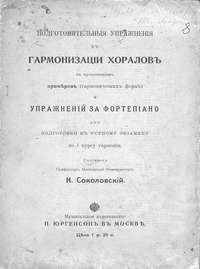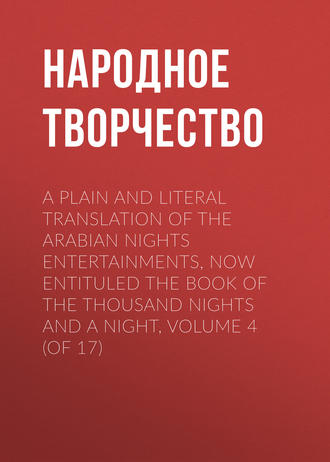 полная версия
полная версияA plain and literal translation of the Arabian nights entertainments, now entituled The Book of the Thousand Nights and a Night, Volume 4 (of 17)
270
This prejudice extends all over the East: the Sanskrit saying is “Kvachit káná bhaveta sádhus” – now and then a monocular is honest. The left eye is the worst and the popular idea is, I have said, that the damage will come by the injured member.
271
The Arabs say like us, “Short and thick is never quick” and “Long and thin has little in.”
272
Arab. “Ba’azu layáli,” some night when his mistress failed him.
273
The fountain in Paradise before noticed.
274
Before noticed as the Moslem St. Peter (as far as the keys go).
275
Arab “Munkasir” = broken, frail, languishing – the only form of the maladive allowed. Here again we have masculine for feminine: the eyelids show love-desire, but, etc.
276
The river of Paradise.
277
See Night xii, “The Second Kalandar’s Tale;” vol. i. 113.
278
Lane (ii. 472) refers for specimens of calligraphy to Herbin’s “Développements, etc.” There are many more than seven styles of writing as I have shown in Night xiii.; vol. i. 129.
279
Amongst good Moslems this would be a claim upon a man.
280
These lines have occurred twice already: and first appear in Night xxii. I have borrowed from Mr. Payne (iv. 46).
281
Arab. “Ya Nasráni”; the address is not intrinsically slighting but it may easily be made so. I have elsewhere noted that when Julian (is said to have) exclaimed “Vicisti Nazarene!” he was probably thinking in Eastern phrase “Nasarta, yá Nasráni!”
282
Thirst is the strongest of all pleas to an Eastern, especially to a Persian who never forgets the sufferings of his Imam, Husayn, at Kerbela: he would hardly withhold it from the murderer of his father. There is also a Hadis, “Thou shalt not refuse water to him who thirsteth in the desert.”
283
Arab. “Zimmi” which Lane (ii. 474) aptly translates a “tributary.” The Koran (chapt. ix.) orders Unbelievers to Islamize or to “pay tribute by right of subjection” (lit. an yadin = out of hand, an expression much debated). The least tribute is one dinar per annum which goes to the poor-rate; and for this the Kafir enjoys protection and almost all the civil rights of Moslems. As it is a question of “loaves and fishes” there is much to say on the subject; “loaves and fishes” being the main base and foundation of all religious establishments.
284
This tetrastich has before occurred; so I quote Lane (ii. 444).
285
In Night xxxv. the same occurs with a difference.
286
The old rite, I repeat, has lost amongst all but the noblest of Arab tribes the whole of its significance; and the traveller must be careful how he trusts to the phrase “Nahnu málihin” – we are bound together by the salt.
287
Arab. “Aláma” = Alá-má = upon what? wherefore?
288
Arab. “Mauz”; hence the Linnean name Musa (paradisiaca, etc). The word is explained by Sale (Koran, chapt. xxxvii. 146) as “a small tree or shrub;” and he would identify it with Jonah’s gourd.
289
Lane (ii. 446) “bald wolf or empowered fate,” reading (with Mac.) Kazá for Kattan (cat).
290
i. e. “The Orthodox in the Faith.” Ráshid is a proper name; witness that scourge of Syria, Ráshid Pasha. Born in 1830, of the Haji Nazir Agha family, Darrah-Beys of Macedonian Draina, he was educated in Paris where he learned the usual hatred of Europeans: he entered the Egyptian service in 1851; and, presently exchanging it for the Turkish, became in due time Wali (Governor-General) of Syria which he plundered most shamelessly. Recalled in 1872, he eventually entered the Ministry and on June 15, 1876, he was shot down, with other villians like himself, by gallant Captain Hasan, the Circassian (Yarham-hu ‘lláh!).
291
Quoted from a piece of verse, of which more presently.
292
This tetrastich has occurred before (Night cxciii.). I quote Lane (ii. 449), who quotes Dryden’s Spanish Friar: -
There is a pleasure sure in being madWhich none but madmen know.293
Lane (ii. 449) gives a tradition of the Prophet, “Whoso is in love, and acteth chastely, and concealeth (his passion) and dieth, dieth a martyr.” Sakar is No. 5 Hell for Magi, Guebres, Parsis, etc.; it is used in the comic Persian curse, “Fi’n-nári wa Sakar al-jadd w’al-pidar” – In Hell and Sakar his grandfather and his father.
294
Arab. “Sifr”: I have warned readers that whistling is considered a kind of devilish speech by the Arabs, especially the Badawin; and that the traveller must avoid it. It savours of idolatry: in the Koran we find (chapt. viii. 35), “Their prayer at the House of God (Ka’abah) is none other than whistling and hand-clapping;” and tradition says that they whistled through their fingers. Besides many of the Jinn have only round holes by way of mouths and their speech is whistling – a kind of bird-language like sibilant English.
295
Arab. “Kíl wa kál” = lit. “it was said and he said;” a popular phrase for chit-chat, tittle-tattle, prattle and prate, etc.
296
Arab. “Hadis,” comparing it with a tradition of the Prophet.
297
Arab. “Mikashshah,” the thick part of a midrib of a palm-frond soaked for some days in water and beaten out till the fibres separate. It makes an exceedingly hard, although not a lasting broom.
298
Persian, “the youth, the brave;” Sansk. Yuván; and Lat. Juvenis. The Kurd, in tales, is generally a sturdy thief; and in real life is little better.
299
Arab. “Yá Shátir;” lit. O clever one (in a bad sense).
300
Lane (ii. 453) has it, “that I may dress thy hair,” etc. This is Bowdlerising with a witness.
301
The sign of respect when a personage dismounts (Pilgrimage i. 77).
302
So the Hindus speak of “the defilement of separation” as if it were an impurity.
303
Lane (i. 605) gives a long and instructive note on these public royal banquets which were expected from the lieges by Moslem subjects. The hanging-penalty is, perhaps, a little exaggerated; but we find the same excess in the priestly Gesta Romanorum.
304
Had he eaten it he would have become her guest. Amongst the older Badawin it was sufficient to spit upon a man (in entreaty) to claim his protection: so the horse-thieves when caught were placed in a hole in the ground covered over with matting to prevent this happening. Similarly Saladin (Saláh al-Din) the chivalrous would not order a cup of water for the robber, Reynald de Châtillon, before putting him to death.
305
Arab. “Kishk” properly “Kashk” = wheat-meal coarsely ground and eaten with milk or broth. It is de rigueur with the Egyptian Copts on the “Friday of Sorrow” (Good Friday): and Lane gives the recipe for making it (M. E. chapt. xxvi).
306
In those days distinctive of Moslems.
307
The euphemism has before been noticed: the Moslem reader would not like to pronounce the words “I am a Nazarene.” The same formula occurs a little lower down to save the reciter or reader from saying “Be my wife divorced,” etc.
308
Arab. “Hájj,” a favourite Egyptianism. We are wrong to write Hajji which an Eastern would pronounce Háj-jí.
309
This is Cairene “chaff.”
310
Whose shell fits very tight.
311
His hand was like a raven’s because he ate with thumb and two fingers and it came up with the rice about it like a camel’s hoof in dirty ground. This refers to the proverb (Burckhardt, 756), “He comes down a crow-claw (small) and comes up a camel-hoof (huge and round).”
312
Easterns have a superstitious belief in the powers of food: I knew a learned man who never sat down to eat without a ceremonious salam to his meat.
313
Lane (ii. 464), uses the vile Turkish corruption “Rustum,” which, like its fellow “Rustem,” would make a Persian shudder.
314
Arab. “Darrij” i. e. let them slide (Americanicè).
315
This tetrastich has occurred before: so I quote Mr. Payne (in loco).
316
Shaykh of Al-Butnah and Jábiyah, therefore a Syrian of the Hauran near Damascus and grandson to Isú (Esau). Arab mystics (unlike the vulgar who see only his patience) recognise that inflexible integrity which refuses to utter “words of wind” and which would not, against his conscience, confess to wrong-doing merely to pacify the Lord who was stronger than himself. The Classics taught this noble lesson in the case of Prometheus versus Zeus. Many articles are called after Job e. g. Ra’ará’ Ayyub or Ghubayrá (inula Arabica and undulata), a creeper with which he rubbed himself and got well: – the Copts do the same on “Job’s Wednesday,” i. e. that before Whit Sunday O.S. Job’s father is a nickname of the camel, etc. etc.
317
Lane (in loco) renders “I am of their number.” But “fí al-siyák” means popularly “(driven) to the point of death.”
318
Lit. = “pathway, road”; hence the bridge well known as “finer than a hair and sharper than a sword,” over which all (except Khadijah and a chosen few) must pass on the Day of Doom; a Persian apparatus bodily annexed by Al-Islam. The old Guebres called it Pul-i-Chinávar or Chinávad and the Jews borrowed it from them as they did all their fancies of a future life against which Moses had so gallantly fought. It is said that a bridge over the grisly “brook Kedron” was called Sirát (the road) and hence the idea, as that of hell-fire from Ge-Hinnom (Gehenna) where children were passed through the fire to Moloch. A doubtful Hadis says, “The Prophet declared Al-Sirát to be the name of a bridge over hell-fire, dividing Hell from Paradise” (pp. 17, 122, Reynold’s trans. of Al-Siyuti’s Traditions, etc.). In Koran i. 5, “Sirát” is simply a path, from sarata, he swallowed, even as the way devours (makes a lakam or mouthful of) those who travel it. The word was orig. written with Sín but changed for easier articulation to Sád, one of the four Hurúf al-Mutabbakát (ط, ض, ص and ظ), “the flattened,” formed by the broadened tongue in contact with the palate. This Sad also by the figure Ishmám (= conversion) turns slightly to a Zá, the intermediate between Sin and Sad.
319
The rule in Turkey where catamites rise to the highest rank: C’est un homme de bonne famille (said a Turkish officer in Egypt) il a été acheté. Hence “Alfi” (one who costs a thousand) is a well-known cognomen. The Pasha of the Syrian caravan, with which I travelled, had been the slave of a slave and he was not a solitary instance (Pilgrimage i. 90).
320
The device of the banquet is dainty enough for any old Italian novella; all that now comes is pure Egyptian polissonnerie speaking to the gallery and being answered by roars of laughter.
321
i. e. art thou ceremonially pure and therefore fit for handling by a great man like myself?
322
In past days before Egypt was “frankified” many overlanders used to wash away the traces of travel by a Turkish bath which mostly ended in the appearance of a rump-wriggling little lad who offered to shampoo them. Many accepted his offices without dreaming of his usual use or misuse.
323
Arab. “Imám.” This is (to a Moslem) a most offensive comparison between prayer and car. cop.
324
Arab “Fi zaman-hi,” alluding to a peculiarity highly prized by Egyptians; the use of the constrictor vaginæ muscles, the sphincter for which Abyssinian women are famous. The “Kabbázah” (= holder), as she is called, can sit astraddle upon a man and can provoke the venereal orgasm, not by wriggling and moving but by tightening and loosing the male member with the muscles of her privities, milking it as it were. Consequently the casse-noisette costs treble the money of other concubines (Ananga-Ranga, p. 127).
325
The little eunuchs had evidently studied the Harem.
326
Lane (ii. 494) relates from Al-Makrizi, that when Khamárawayh, Governor of the Egypt (ninth century), suffered from insomnia his physician ordered a pool of quicksilver, 50 by 50 cubits, to be laid out in front of his palace, now the Rumaylah square. “At the corners of the pool were silver pegs to which were attached by silver rings, strong bands of silk, and a bed of skins, inflated with air, being thrown upon the pool and secured by the bands remained in a continual state of agreeable vacillation.” We are not told that the Prince was thereby salivated like the late Colonel Sykes when boiling his mercury for thermometric experiments.
327
The name seems now unknown. “Al-Khalí’a” is somewhat stronger than “Wag,” meaning at least a “wicked wit.” Properly it is the Span. “perdido,” a youth cast off (Khala’) by his friends; though not so strong a term as “Harfúsh” = a blackguard.
328
Arab. “Farsakh” = parasang.
329
Arab. “Nahás asfar” = yellow copper, brass as opposed to Nahás ahmar = copper. The reader who cares to study the subject will find much about it in my “Book of The Sword,” chapt. iv.
330
Lane (ii. 479) translates one stanza of this mukhammas (pentastich) and speaks of “five more,” which would make six.
331
A servile name, Delicacy, Elegance.
332
These verses have occurred twice: (Night ix. etc.) so I give Lane’s version (ii. 482).
333
A Badawi tribe to which belonged the generous Ma’an bin Za’idah, often mentioned in The Nights.
334
Wealthy harems, I have said, are hot-beds of Sapphism and Tribadism. Every woman past her first youth has a girl whom she calls her “Myrtle” (in Damascus). At Agbome, capital of Dahome, I found that a troop of women was kept for the use of the “Amazons” (Mission to Gelele, ii. 73). Amongst the wild Arabs, who ignore Socratic and Sapphic perversions, the lover is always more jealous of his beloved’s girl-friends than of men rivals. In England we content ourselves with saying that women corrupt women more than men do.
335
The Hebrew Pentateuch; Roll of the Law.
336
I need hardly notice the brass trays, platters and table-covers with inscriptions which are familiar to every reader: those made in the East for foreign markets mostly carry imitation inscriptions lest infidel eyes fall upon Holy Writ.
337
These six distichs are in Night xiii. I borrow Torrens (p. 125) to show his peculiar treatment of spinning out 12 lines to 38.
338
Arab. “Musámirah” = chatting at night. Easterns are inordinately fond of the practice and the wild Arabs often sit up till dawn, talking over the affairs of the tribe, indeed a Shaykh is expected to do so. “Early to bed and early to rise” is a civilised not a savage or a barbarous saying. Samír is a companion in night talk; Rafík of the road; Rahíb in riding horse or camel; Ká’id in sitting; Sharíb and Rafís at drink, and Nadím at table: Ahíd is an ally, and Sharík a partner – all on the model of “Fa’íl.”
339
In both lover and beloved the excess of love gave them this clairvoyance.
340
The prayer will be granted for the excess (not the purity) of her love.
341
This wailing over the Past is one of the common-places of Badawi poetry. The traveller cannot fail, I repeat, to notice the chronic melancholy of peoples dwelling under the brightest skies.
342
Moons = Budúr: in Paradise as a martyr.
343
i. e. to intercede for me in Heaven; as if the young woman were the Prophet.
344
– It occurs in AL.


So I embraced him close as Lám cleaves to Alif;
And again: —
She laid aside reluctance and I embraced her close
As if I were Lám and my love Alif.
The Lomad-Olaph in Syraic is similarly colligated
345
Here is a double entendre “and the infirm letters (viz. a, w and y) not subject to accidence, left him.” The three make up the root “Awi” = pitying, condoling.
346
Showing that consummation had taken place. It was a sign of good breeding to avoid all “indecent hurry” when going to bed. In some Moslem countries the bridegroom does not consummate the marriage for seven nights; out of respect for (1) father (2) mother (3) brother and so forth. If he hurry matters he will be hooted as an “impatient man” and the wise will quote, “Man is created of precipitation” (Koran chapt. xxi. 38), meaning hasty and inconsiderate. I remark with pleasure that the whole of this tale is told with commendable delicacy. O si sic omnia!
347
Pers. Nauroz (= nau roz, new day): here used in the Arab. plur. “Nawáriz” as it lasted six days. There are only four universal festivals; the solstices and the equinoxes; and every successive religion takes them from the sun and perverts them to its own private purposes. Lane (ii. 496) derives the venerable Nauroz whose birth is hid in the outer glooms of antiquity from “the Jewish Passover” (!)
348
Again the “babes” of the eyes.
349
i. e. whose glance is as the light of the glowing braise or (embers). The Arab. “Mikbás” = pan or pot full of small charcoal, is an article well known in Italy and Southern Europe. The word is apparently used here because it rhymes with “Anfás” (souls, spirits).
350
i. e. martyrdom; a Koranic term “fi sabíli ‘llahi” = on the way of Allah.
351
These rhymes in – y, – ee and – ie are purposely affected, to imitate the cadence of the Arabic.
352
Arab. Sujúd, the ceremonial prostration, touching the ground with the forehead. So in the Old Testament “he bowed (or fell down) and worshipped” (Gen. xxiv., 26: Mat. ii., 11), of which our translation gives a wrong idea.
353
Thus written ا hence as has been seen, a girl is called Alfiyyah = A-shaped.
354
i. e. the medial form of m =
355
i. e. the inverted n.
356
It may also mean a “Sevigné of pearls.”
357
Koran xxvii. 12. This was one of the nine “signs” to wicked “Pharaoh.” The “hand of Moses” is a symbol of power and ability (Koran vii. 105). The whiteness was supernatural beauty, not leprosy of the Jews (Exod. iv. 6); but brilliancy, after being born red or black: according to some commentators, Moses was a negro.
358
Koran iii. 103; the other faces become black. This explains, I have noticed, the use of the phrases in blessing and cursing.
359
Here we have the naked legend of the negro’s origin; one of those nursery tales in which the ignorant of Christendom still believe. But the deduction from the fable and the testimony to the negro’s lack of intelligence, though unpleasant to our ignorant negrophils, are factual and satisfactory.
360
Koran, xcii. 1, 2: an oath of Allah to reward and punish with Heaven and Hell.
361
Alluding to the “black drop” in the heart: it was taken from Mohammed’s by the Archangel Gabriel. The fable seems to have arisen from the verse “Have we not opened thy breast?” (Koran, chapt. xciv. 1). The popular tale is that Halímah, the Badawi nurse of Mohammed, of the Banu Sa’ad tribe, once saw her son, also a child, running towards her and asked him what was the matter. He answered, “My little brother was seized by two men in white who stretched him on the ground and opened his belly!” For a full account and deductions see the Rev. Mr. Badger’s article, “Muhammed” (p. 959) in vol. iii. “Dictionary of Christian Biography.”
362
Arab, “Sumr,” lit. brown (as it is afterwards used), but politely applied to a negro: “Yá Abu Sumrah!” O father of brownness.
363
Arab. “Lumá” = dark hue of the inner lips admired by the Arabs and to us suggesting most unpleasant ideas. Mr. Chenery renders it “dark red” and “ruddy,” altogether missing the idea.
364
Arab. “Saudá,” feminine of aswad (black), and meaning black bile (melancholia) as opposed to leucocholia.
365
i. e. the Magians, Sabians, Zoroastrians.
366
The “Unguinum fulgor” of the Latins who did not forget to celebrate the shining of the nails although they did not Henna them like Easterns. Some, however, have suggested that Ῥοδοδάκτυλος alludes to colouring matter.
367
Women with white skins are supposed to be heating and unwholesome: hence the Hindu Rajahs slept with dark girls in the hot season.
368
Moslems sensibly have a cold as well as a hot Hell, the former called Zamharir (lit. “intense cold”) or Al-Barahút, after a well in Hazramaut; as Gehenna (Arab. Jahannam) from the furnace-like ravine East of Jerusalem (Night cccxxv). The icy Hell is necessary in terrorem for peoples who inhabit cold regions and who in a hot Hell only look forward to an eternity of “coals and candles” gratis. The sensible missionaries preached it in Iceland till foolishly forbidden by Papal Bull.
369
Koran ii. 26; speaking of Abraham when he entertained the angels unawares.
370
Arab “Rakb,” usually applied to a fast-going caravan of dromedary riders (Pilgrimage ii. 329). The “Cafilah” is Arab.: “Caravan” is a corruption of the Pers. Karwán.
371
A popular saying. It is interesting to contrast this dispute between fat and thin with the Shakespearean humour of Falstaff and Prince Henry.
372
Arab. “Dalak” vulg Hajar al-Hammam (Hammam-stone). The comparison is very apt: the rasps are of baked clay artificially roughened (see illustrations in Lane M. E. chapt. xvi.) The rope is called “Masad,” a bristling line of palm-fibre like the coir now familiarly known in England.


